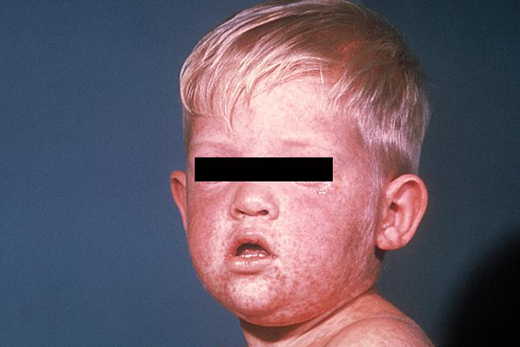The Waikato District Health Board says three measles cases have been discovered in the region.
It is believed a Waikato person contracted the disease during an overseas trip and upon their return inadvertently passed the highly infectious viral illness on to at least two others.
A red blotchy rash which starts on the face is a symptom of measles. Photo: Ministry of Health
During their infectious periods the three people attended the Waikato Hospital Emergency Department on Friday March 25; Monday, April 4; and Saturday, April 9.
If you attended the emergency department on those dates you may have been exposed as people who share the same air as an infected person is at risk of developing the disease.
Medical Officer of Health Dr Felicity Dumble says in 2014 there were 124 cases of measles in Hamilton associated with an outbreak. Following this latest outbreak the health board has since circulated information to emergency departments and general practices.
'These are the same measures we had to put in place during the outbreaks of 2014 and 2015. We learnt very early that we had to be very strict with the quarantine and by being strict it will prevent further cases at the school,” she says.
'Measles can be a very serious illness, with one in three sufferers experiencing complications such as ear infections, pneumonia, bronchitis or diarrhoea. On average one in 10 cases will require hospitalisation.”
Measles is a vaccine-preventable disease and anyone who has had at least two doses of the Measles, Mumps and Rubella vaccination is considered immune.
But people most at risk of contracting the disease are those who have either not had the MMR vaccine, or who have just had one dose of the vaccine.
Felicity says immunisation is the best protection from this potentially serious disease.
'Immunisation protects not only the individual, but also blocks the spread of this disease within our communities.
'It's a timely reminder to everyone else to check that they and their children are fully immunised against measles. Vaccination affords full immunity in the vast majority of cases.”
WHAT IS MEASLES AND WHAT ARE THE SIGNS AND SYMPTOMS?
Measles is a highly infectious virus that spreads easily from person to person through the air, via breathing, coughing and sneezing. It affects both children and adults.
The incubation period for measles is approximately two weeks – meaning it can take up to two weeks from exposure to show symptoms.
The first symptoms are a fever, as well as a runny nose, cough, sore red eyes and sometimes small white spots on the back inner cheek of the mouth.
After a few days a red blotchy rash comes on which usually starts on the face before spreading to the body. The rash lasts up to one week.
Non-immunised people who have had contact with a person with measles will normally be advised to stay at home and away from all public places, school or work for 14 days after their contact.
Measles can be life threatening with about 1 in 10 people who contract the disease requiring hospitalisation.
Measles can also lead to other complications includes ear infections which can lead to permanent hearing loss, diarrhoea, pneumonia, seizures and swelling of the brain – which is rare but can cause permanent brain damage or death.
If families suspect someone has measles they should call their doctor, where possible, before visiting to avoid spreading the disease in the waiting room.
For more information visit the Waikato District Health Board's website at: www.waikatodhb.health.nz/measles



0 comments
Leave a Comment
You must be logged in to make a comment.